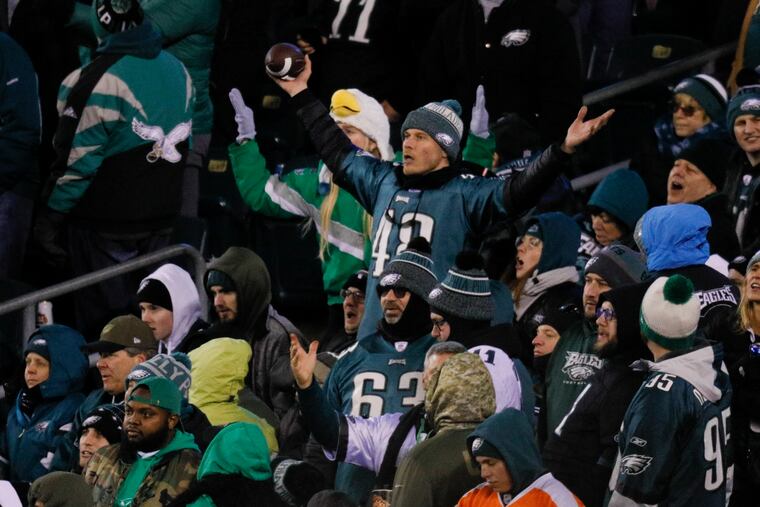In confusion between the Eagles and the city, clarity and honesty are the casualties | Mike Sielski
In the absence of competency and control, a large institution, such as city government or a sports league, will fake it.

The words read with such apparent clarity and conviction. There was Thomas Farley, Philadelphia’s health commissioner, speaking to reporters Tuesday about the latest edict from Mayor Jim Kenney about what the city’s residents could and could not do, where they could and could not go, to protect themselves from the coronavirus. The city was announcing a moratorium, through February, on large public events that require permits. And someone asked Farley whether the measure would apply to Eagles games at Lincoln Financial Field – which it would not – and Farley sure seemed definitive about what the Eagles’ position ought to be and already was.
“I do not think that they can have spectators at those games,” he said. “There’s no way for them to be safe having a crowd there. I can’t say what the plans are for the league, but from a safety perspective, they can play games but not [have] crowds.”
Sure enough, there was managing director Brian Abernathy with a reaffirmation: “We have been in communication with the Eagles. We have told them our expectations are that they don’t have fans. And my understanding is NFL guidelines also provide authority and remind teams that local authorities have the ability to ban fans, so I don’t expect any issues.”
Well. With that, there was chaos and confusion, all over answers that seemed as clear as a billboard message but were actually as vague as finger paint. No fans at the Linc at all? This already had been decided?
This was surely news to the Eagles. It made no sense. Just last week, the franchise sent an email to its season-ticket holders telling them that they could opt out of paying for their seats this year and still hold on to those seats for the 2021 season. Within that email, the Eagles said they anticipated that certain seating areas would be unavailable, and they allowed for the possibility that they “will have to significantly reduce the stadium’s seating capacity. … We will communicate more information as the season approaches and our plans take shape.”
The deadline for ticket-holders to opt out was Wednesday, July 15. It’s inconceivable that the Eagles would have gone along with having city officials state publicly, the day before fans had their last chance to get their money back, that none of those fans would be allowed at the Linc. The phone lines at the Eagles’ ticket office would have been tied up for 24 hours – and they probably were – and team owner Jeffrey Lurie would have resembled one of the Duke brothers at the end of Trading Places, entering full apoplexy over the plummeting price of frozen concentrated orange juice.
So the city came back with another statement Wednesday, a clarification. Would the Eagles be permitted to host a football game at the Linc today? Tomorrow? No, not as long as the city remains in its iteration of Gov. Tom Wolf’s “Green Phase,” which prohibits outdoor events of 50 people or more. “However,” the statement read, “this is a fluid situation, and this policy is under constant review. Discussions between the City and the Eagles are ongoing.” That is, Philadelphia and its football team might yet work out an agreement to allow fans inside the Linc.
So why the confusion? Because the veneer of competency and control is vital to any large institution, and in the absence of those qualities, it’s better to project them than acknowledge you lack them. Our political leaders can be particularly brazen in this regard, but they’re not the only ones who rely on such sleight-of-hand.
The NFL itself, for instance, hasn’t yet established a uniform standard for an appropriate crowd size. According to a report last month by The Athletic, the league will let each team set its own attendance-capacity limit, which would create problems of competitive equity, of home-field advantages that were truly unfair. But by all appearances, commissioner Roger Goodell and the league are trucking along with their plans to start training camp on time, as if such questions about the pandemic and the conditions it creates and demands will just answer themselves sometime before early September.
A simple admission that the virus’ spread has been unpredictable, that scaling back the protocols and protections might or might not lead to another spike in cases, that no one has a good sense of what will happen next – that’s the thing no one wants to say and no one wants to hear. The appropriate use of three little words, I don’t know, has been one of the casualties of our social-media society, and this pandemic has only accelerated the demise of that often-honest and powerful phrase.
That’s all Thomas Farley or Brian Abernathy had to say Tuesday. That’s all Goodell or Lurie or anyone affiliated with the NFL has to say when asked about what’s ahead in a COVID-19 world. We’re doing our best. We’re trying to figure it out. But we don’t know. It’s the truth. Games? Fans? Sundays in the fall as we’re used to them? Life as we’re used to it? No one knows, and everyone should have the decency and integrity to stop faking it.